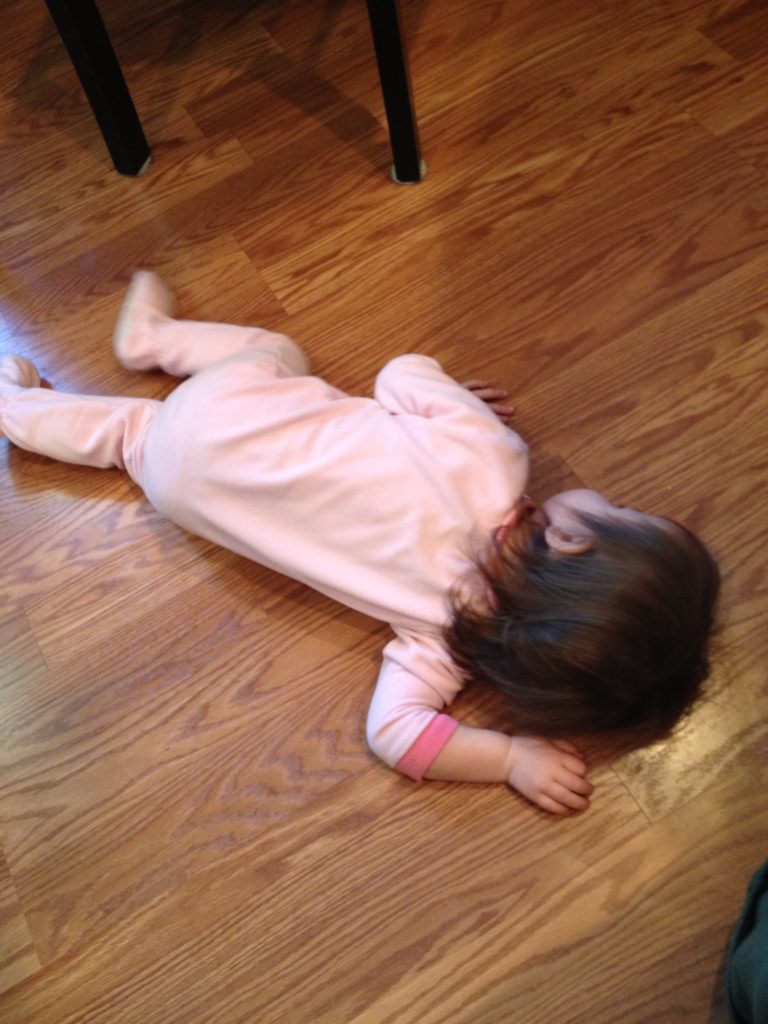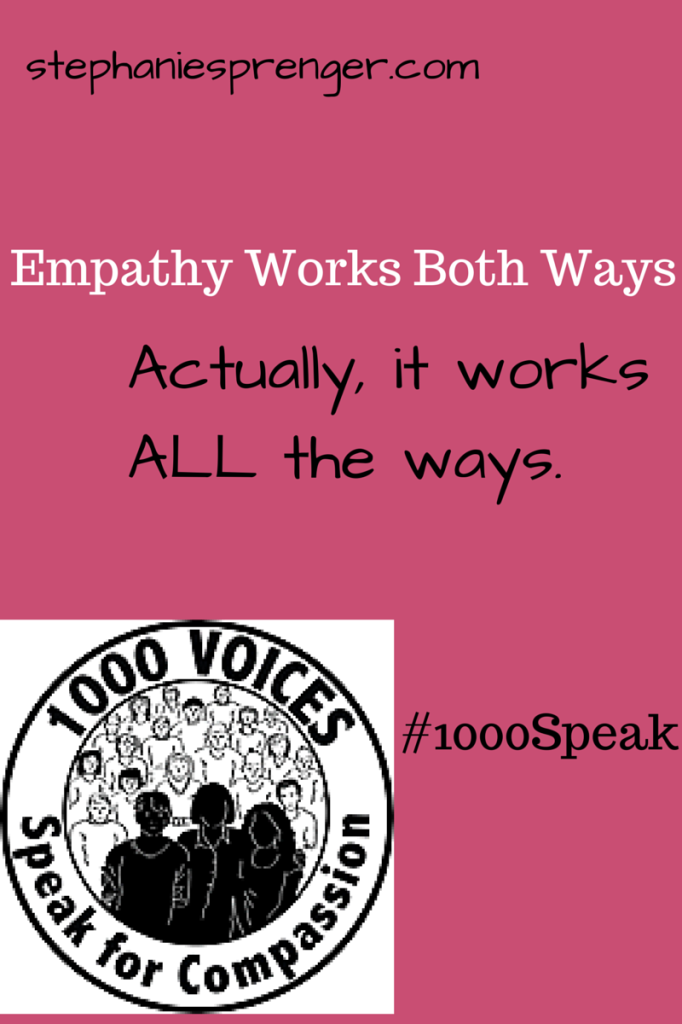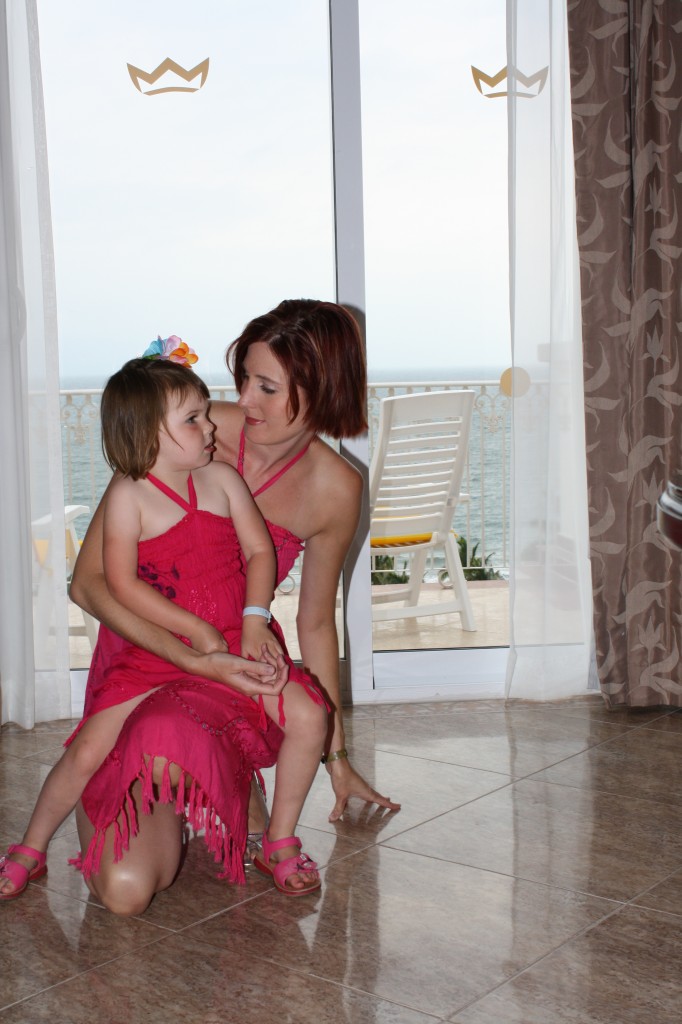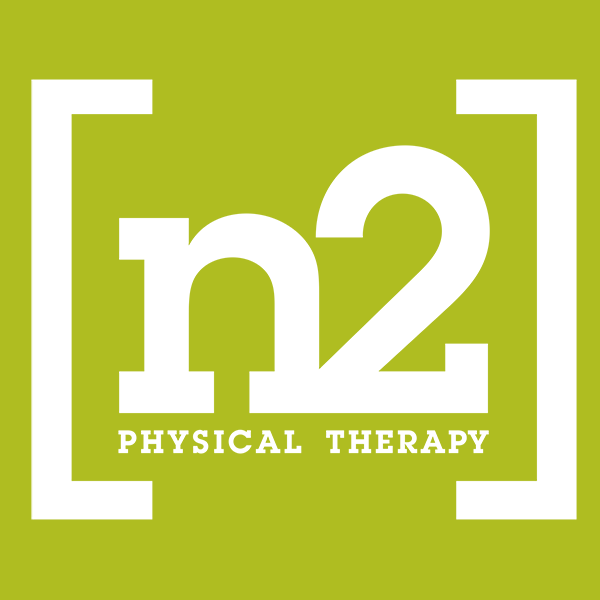The Mommy-and-Me class is like the airport of people-watching for parents. I happen to know most of the families that are here today pretty well, and I alternately engage with the moms and remain on the periphery, observing. The kids here are all under two, still in the wild animal stage of life, forces of nature. One precocious little girl repeatedly takes the toys of the children around her, a behavior that is pretty common among this age group. Some of the kids passively let go, some squawk, and her mother occasionally intervenes apologetically. As her daughter snags yet another toy from a friend’s hand, the woman grabs a spare and hands it quickly to the little boy to placate him. To an outsider, this gesture would appear to be adequate.
But I know that this little boy spent months of his life in the hospital with a critical respiratory illness. He was a NICU baby with a host of lingering complications, and he is now medically fragile. Everywhere they go, his mom brings their own toys with them, so that her little boy can still participate and have what all the other kids have, without exposing him unnecessarily to community toys and germs. The fact that she is even at this class is a huge act of bravery. She is self-conscious and apologetic about bringing her own supplies; she doesn’t want to look like that mom.
So as the little girl’s mom hands her son a used ball, I see her mouth pinch into a tight line. She doesn’t want to make a scene or appear ungrateful. And I can tell how hard it is for her not to take her son’s ball out of the little girl’s hand and say, “Actually, this is a special ball just for Owen. I need to take it back.”
I feel my face burn with anger. How dare this other mom just assume it’s OK for the kids to trade toys? She has no idea what a big deal it is! Of course she doesn’t.
A few minutes later, her daughter is in her lap, pawing at her zipped jacket and whining. She attempts to distract her child with a sippy cup, which inspires a fresh wave of writhing and screeching. As a mother who nursed a child for sixteen months, I can see exactly what’s happening: her toddler is going through the “I want to nurse every few minutes around the clock and I don’t care where we are!” phase, and she’s struggling. Her face crumples a little and she sighs heavily. Parenting a nursing toddler is exausting and emotionally taxing. She’s spent.
This time I am flooded with compassion for her. She’s having a hard time, too. Should she be expected to consider the personal circumstances of the other mom, the one trying to protect her son’s immune system?
The point is: There are always two sides. Neither mom was wrong. Justice is not always clearly defined, is it? When I wrote about trying to teach my music therapy intern to have compassion for the moms who attend our classes, I wrote,
The point is, when we begin our classes each morning, we have no idea what the parents have been through that day, that week, or even that year. Maybe they are grumpy, disheveled, and show up in sweats, or maybe they are dolled up, looking perfect, because it’s the only time all week they get to do so and it matters so much to them that they feel a bit like their old selves. Maybe they are loving their new motherhood gig. Maybe they hate it. We have no idea. But before we judge them—before any mom or non-mom or teacher or clerk judges a mother—we would do right to dig deep and find our empathy. This is certainly not exclusive to moms; wouldn’t we all be better off if we applied the same principle to the irritable DMV worker or slow waitress?
As humans, we all fall into the hypocrisy trap. One morning I was driving to work and let loose a string of expletives when an ill-prepared driver tried to cut in front of me in a construction zone. Clearly, the moron wasn’t paying attention and attempted to merge too late. What an idiot! Of course, the next day as I drove into the construction zone, I yelled in frustration when the cars in front of me wouldn’t let me in. Because that day, I was the idiot who wasn’t paying attention and missed my opportunity to merge in a timely fashion. We will always have the opportunity to be on the other side of things, a cosmic guarantee that is both humbling and maddening.
Because who lives in a constant state of heightened empathy? How many of us are instantly able to put ourselves in another’s shoes when we are experiencing anger, frustration, or feeling misunderstood? It’s nearly impossible. And yet I firmly believe that the ability to turn empathy on quickly is the key to, at the risk of sounding dramatic, almost everything.
A few weeks ago I had a meltdown about something so stupid I can no longer recall the details. I was stretched to my breaking point, and I had an actual temper tantrum. It was in the height of the #SoGladTheyToldMe frenzy, and I had simply burned out. The house was a mess. I was constantly forgetting things. And yet as I cried and raged my husband said, “Why don’t you go take a break and have some Stephanie time?” (Oh, I remember! I had deleted fifteen rows of an important spreadsheet.) He told me how sorry he was that I had to redo my work and he didn’t for one second make me feel like a baby for getting upset over it. His reaction, loaded with empathy, completely defused me.
He could have been absolutely sick to death of the messy house, a distracted wife, and now a litany of complaints on top of it. But he didn’t consider his own feelings. He considered mine. That is empathy in action. It’s powerful. And the beautiful thing is, after having received that gift, I felt more and more compelled to offer it back to him whenever I could. It’s circular. And it matters very little who was “in the right” and who was “in the wrong.” It’s not about whether protecting the toys of a medically fragile child is a larger burden than a difficult, nursing toddler and the accompanying sleep deprivation. When we are able to be truly empathetic, that ranking system, that sense of justice, ceases to matter.
The difficulty with this is that sometimes it feels like it is black and white. Sometimes we believe that we really are right and that injustice is happening. But how powerful would it be if even in those moments we could allow just an ounce of empathy through, to imagine what was on the other side? I’m not religious, people, but that’s sounding sort of Jesus-y.
Compassion for Our Kids, Compassion for Ourselves
As a parent, my empathy is tested often through interactions with my kids. I feel waves of irritation and even disgust at their whiny, entitled behavior and ridiculous complaints. I can muster up very little compassion for my three-year-old who is on a crying bender because she did not want to watch one episode of Rescue Bots, she wanted to watch a lot of shows. Or for my third grader who is pouting because she was not given the opportunity to ingest an entire box of Girl Scout cookies, or perhaps is feeling jealous that her friend has the Lego Friends Total Cosmos! Set while she only has the pathetic jungle.
What a couple of whiners.
And then I remember how disappointed I was when my plans were changed at the last minute. When a sick kid interfered with my plans for yoga class or uninterrupted work time. When I was jealous that I couldn’t afford to go on a shopping spree for new clothes. I often feel disgusted with myself for being disappointed, or overly emotional, or feeling envious or greedy. So it’s no wonder that I can’t tolerate those feelings in my children—because they represent the ugliest parts of myself. Most parents will attest to the fact that we are frequently triggered by the child who is just like us.
Which raises another question: Is empathy difficult because it’s hard to feel compassion for someone who is on the “other side” of where we are, or is it because we recognize things on that “other side” that hit too close to home? Is it more difficult to have true compassion for another person, or is it harder to have compassion for ourselves? Chew on that for a second.
I meant it when I said that I believe that empathy is the key to true connection and personal peace. But maybe it starts with finding compassion for ourselves in addition to finding compassion for others.
**I am so honored to be joining forces with the #1000 Speak Movement, a group of 1000 bloggers who all committed to writing posts about compassion today. Compassion—particularly for moms who may be struggling— is one of my biggest passions. It’s really why I wrote I’m Glad They Warned Me and why the #SoGladTheyToldMe movement took off—mothers want to empathize and support one another. I think #1000 Speak is amazing. Here’s a little background:
On February 20th, 2015, over 1000 of us will raise our voices and our writing, and flood the internet (and our real worlds) with GOOD and COMPASSION.
It started with an understanding that even though we might get older, we still all need the metaphorical village around us, and the compassion of others in our lives. Then the sudden thought happened – what if 1000 of us wrote about compassion all at once? From there, the movement has taken on its own life; has burgeoned and grown and spread a whole lot of love and connection and ‘villageyness’.
Every voice matters – together we’re stronger – let’s BE the Village.
Join the 1000 Voices Speak for Compassion group on Facebook. Check out more posts by visiting the creators, Yvonne and Lizzi.
Let’s connect! You can find me on Facebook, Twitter, and Pinterest!
Keep up with all my latest posts right here!
[jetpack_subscription_form]













Excellent post! You’re so right in reminding us that everyone has their own struggle.
This was written so beautifully. How many times have I myself been too hasty to think something awful of another mommy or person only to be in that same position a couple of days later. Even though the word “empathy” has never had that much meaning to me, I now know the true meaning and what I can do to show more empathy to my kids, to others and to myself.
Thanks for a really meaningful post.
Oh this hits home! Is it harder to find compassion for others or ourselves? I’m thinking the latter… I’m often way harder on myself. And like you so wisely stated, that is often why I struggle with my older daughter, because I see my less than stellar traits mirrored in hers, and the anger that often accompanies it is really pointed at me. So I wonder, instead of always trying to find more compassion and patience for her, what if I tried for myself. Perhaps the resulting effect would encompass us both.
Lovely thoughts here Stephanie. Congrats on being part of this beautiful movement.
You are so right, we tend to have the least amount of empathy to those who are highlighting our own failings: as a mom, a coworker, a driver on the road. Empathy doesn’t just happen, it has to be thoughtful and aware. Here is hoping we create a lot of awareness 😉
“But how powerful would it be if even in those moments we could allow just an ounce of empathy through, to imagine what was on the other side?”
This.
I feel the same way when my husband has shown empathy instead of telling me it will all be okay or worse…trying to fix it in that moment. Just letting me know he gets it is often enough. It could also be just enough for a frustrated mom at playgroup or anyone else we may encounter.
Great post!
I couldn’t agree more Stephanie and it definitely does start with us and can admit I am not always the best model for it. I try my best, but still just human fall shy of it at times for my own kids. Thanks for the reminder today though.
Love it, love it, LOVE IT! AWESOME. I can relate on so many levels. I’ve both cursed the idiot driver and BEEN the idiot driver (and cyclist, too). I remember having to try really hard to be empathetic towards some of the parents at the nursery where I used to work, and likewise, with my patients now. Especially when they’re rude.
And YES – quick empathy is so important. It diffused a situation here the other morning when Husby scalded his leg and put the kibosh on Valentine’s day. We laughed, I cleaned while he bathed his leg in cool water, and we held hands whilst waiting to be seen at the hospital to check he was okay (he was).
And FYI – Jesus wasn’t a particularly religious bloke. I think he pissed off quite a lot of Jews 😉 . Sounding a bit like Him is a good (and not-religious) thing.
That could have been me that you were shouting at or perhaps it was me who was shouting at you? I do it in the car. A lot. And I know I shouldn’t. Even as I’m spitting on the windshield at the poor woman who is taking ages to cross I know I shouldn’t be shouting. Yet I still do. I’ at my worst when I’m running late. Thank you for the reminder that I need to stop and just think. About her. About others.
Beautiful post and reminder! Nice job friend 🙂
xo,
T.
Awesome post and such a positive and necessary reminder!!
Good job 🙂
xo,
T
It’s true that it’s not black and white! We’re always learning, trying hard and sometimes, fed up of trying! You really laid it out very realistically! And, maybe when we give ourselves a break, we’ll feel great about doing the same for others!
Oh, holy shit, how this post has hit me hard. There is much to “chew” here, and I thank you for it. At the very moment, what’s really hitting home is the bit about empathy in marriage and how it builds. Conversely, a lack of it erodes. Really has me thinking.
But that part about cursing traffic? Yeah, sad to say that hit home pretty hard, too. 🙂
Great Post, Stephanie! I find myself lacking compassion with my kids often too. I think it’s mostly ok, not everybody is a coddler 😉 But anyway, love your perspective on compassion.
Remembering that the person on the other side of the equation has a point, and a history of reasons for having reached it is amazingly important. Dare I say, nailed it? You nailed it. I felt for both the moms – first for the one with the medically fragile boy and then for the other. Love your words, Steph. Always.
Great post Stephanie. I find that it’s the time when I’m feeling the least compassionate towards myself that I’m the least empathetic towards others. That’s when I’m reminded to take care of myself so I can turn outward and care for others a little better. Thanks for sharing your perspective.
The milk of human kindness doesn’t always spring forth spontaneously! You’re right about everyone having their own demons to deal with…yet, how beautiful when we pause and look at both sides of the story. 🙂 We’re only human, and we need to love ourselves to love others. Loved your post, Stephanie. Reminded me of a young mother I saw today on the bus, struggling to pacify her toddler while the men strained to get a look at a little skin. She couldn’t wait to get off the bus.
Great post! Shared.
Very well said. Remembering, or trying to remember to see things from the perspective of others and from different angles is very much what compassion is about!
Great post Stephanie. And your line – “fact that we are frequently triggered by the child who is just like us,” – ouch, that hit home!
You’re right– there are always two sides to everything. And you’re also right that sometimes empathy is hard because a behavior or circumstance hits too close to home. (*Ouch. That one’s a little hard to accept!)
So many good things in here to think about. Always important to remember is that we do not – can not – know what another person is dealing with personally that might cause them to behave in a particular way. But you can guarantee that there is always a reason, whether we might agree with it or not. Always two sides.
Very true that the things we find irritating (or worse) in others are the things we like least about ourselves. Like Galit said, ouch – that one hits close to home for me!
In all things, it’s important to try and step back, look at the whole picture, and try to act as non-emotionally as possible. (Hard. Yes.)
This is an excellent contribution to the discussion today. Empathy for other parents is so important.
Ah… ALL of this resonates so deeply with me, Stephanie!!! From the play group scene to the traffic scene to the work letter to your husband’s precious empathy.
I love this in so many ways…
Wow – that last part. So much to comment on. But yes being triggered by the child who is just like us. I have seen a look or pout about something that hasn’t gone his way and I am like OMG, I know exactly what he’s thinking and how he feels and sometimes it has made me so mad looking at the mini me BECAUSE it’s the mini me. But it is one of the things that makes us truly connected and and understand how he feels about things. Thanks for the insight. *chewing*
Stephanie– I’m familiar with the “mommy” world, as it were, but, it still feels alien. I’m on disability, but started referring to myself as a homesteader, because most guys I met just could NOT grok the idea of fatherhood as work. I live in a small town, and I have to be brutally honest– support for SAHDs is more in the metropolitan, urban cities.
My kids are 7 and 12 now, so I’ve gotten past some of the awkward social interactions– society at large is especially much more tolerant of teenagers, than they are of children. (I *specifically* finger the “does not relate to children” child-free folks; some I’ve met are passively hostile about it.)
Saying all this feels out of left field for me, but, the zealous part of me just felt like boldly asking, “Hey, how about fathers? We aren’t so aloof anymore, y’know.”
This is the most wholesome post I have read on compassion till now. True. compassion is not a one sided affair. There are always two sides to a coin. Unfortunately, in our limited wisdom, we often tend to confer the ‘right’ and ‘wrong’ titles a little too soon. There is always another side to the story and a person who is fighting his/her battle at that end. Really liked your post!
Yes, self-compassion is so important just as Lizzi wrote in her #1000Speak post. I believe that we can learn about ourselves as we become being self-compassionate. So personal growth, where we allow ourselves to be more compassionate for others, can stem from accepting that we ourselves are not perfect but still worthwhile. Thanks for sharing your thoughts!
I am constantly triggered by the child who is just like me! You raise some wonderful points here, Stephanie, and I particularly related to the black/white reference – I tend to hold onto my sense of right. Letting go of that and showing empathy has proved to be amazing for both me and the person I thought was wrong. Even when that person is the child who is just like me. Especially when she is that person, actually.